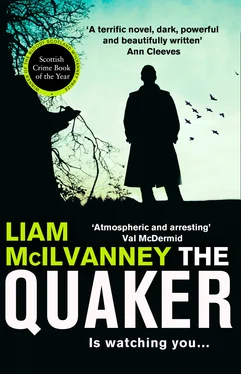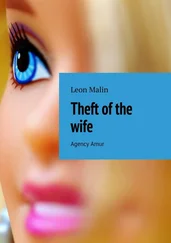The music was loud so it was a struggle to talk but he asked me about my day and he spoke about his job. I wasn’t really listening so much as just enjoying his voice, Glasgow but sort of refined, not like your typical city neds, whining out of the sides of their mouths like someone letting air out of a balloon. He was different altogether. A lot of the guys you’d see in the Barrowland were hard men, or thought they were, always spoiling for a fight. I’d see them in the Vickie on my night shift, carting their sore faces into A&E. I want to say that they didn’t look so clever right then, with their faces gaping open, but the truth is they looked every bit as clever – or every bit as dumb – sitting there with their shirts drenched in blood, pleased as punch, already working out how they’d tell it to their mates. William was different, he seemed older, more sophisticated, somebody who knew things. Good dancer, too.
We left at half-eleven and walked down the Gallowgate to where he’d parked his car. Outside in the streetlights he looked younger than he had in the ballroom. He was twenty-five, maybe twenty-six, though he acted a little older than he was. Even so, I was older by five or six years and I liked it, it made me feel more in control.
His car was a sleek white affair, quite new-looking. He held the passenger door for me while I settled myself in the red leather seat, then he closed the door before walking round to the driver’s side. I leaned against him when the car turned a corner and looked up into his face but he stared straight ahead and kept his hands to himself. He was talking away about decimalization with this earnest look on his face and when the car stopped at a red light I started poking him in the ribs, trying to get him to laugh if nothing else. It was nice he was such a gentleman but he needed to relax a bit. Nothing was going to happen anyway – it was my time of the month – but you’d want some fun from a night at the jiggin.
We got out of the car and he walked me to the closemouth. And now, when we stepped into the darkened close, it all seemed to change, like a switch had flicked. He caught me by the shoulders and pressed his mouth against mine, hard, so that my head bumped against the wall of the close. About time, I thought. Then his hands were busy and his breathing got loud.
‘Not here,’ I told him. ‘Come on.’
I took him down the hill to the lane behind Carmichael Place. I was laughing to myself, because it was like I was fifteen again. This was where you would come with boys, after the pictures or church socials, this is the place you’d winch a little before you went home. I hadn’t been down here in fifteen years, but it was still just the same, the garages and the garden gates.
It was dark in the lane, away from the lights. The ground is all grassy with stones jutting out – not cobbles but ordinary stones, sharp and uneven, and my heel caught on one of the stones and I clutched at his arm, fell against him, really, and I remember I was laughing, I couldn’t stop laughing, it all seemed so funny and my mouth was locked open in this soundless laugh and that’s when he hit me in the mouth.
At first I didn’t know what happened. I thought maybe I’d slipped and bumped his shoulder or maybe someone had come running out of the lane and burst right between us and knocked me out of the way. I staggered backwards and clattered into the double doors of a garage, they rattled and shook. I raised my fingers to my mouth and took them away with something dark and glistening on them. That’s when I looked up and saw him stumping across the lane with his fist raised high. I screamed then but I needed to swallow first and the scream was kind of thin and half-hearted and he stopped it with another punch and there was a kind of judder like you were bumping downstairs and then the ground was scraping my face and I looked up with the eye that could still open and he was standing over me, tugging loose his tie and sawing his head back and forth as he did it.
That was all. Now my father looks like he will never smile again, like he’s forgotten the language of smiling and he’s suddenly old, old, old, he’s a wee small leprechaun, The Incredible Shrinking Man, his collars gaping, his jacket sleeves hanging down past his knuckles, and my mother walks around in a Valium trance. They try to put on happiness for Alasdair’s sake but you can’t fake it, a child isn’t fooled. The boy knows that something’s wrong and of course he thinks it’s his fault.
They worried, when I was out in Germany, Mum and Dad. Anything could happen in a country like that. They were so pleased when I came home, back to the flat in Langside Place, to the numbered buses and the local shops, the streets where nothing bad could happen. It’s hard for them to face the truth: I would have been safer in Germany, in that cramped Army house in Bad Godesberg, tramping through the rain to the NAAFI store.
There are things we need to remember. I tell them to Alasdair, lying weightlessly beside him on the narrow single bed, wishing I could smell his skin. I pour them into his ears while he sleeps and I tell myself that when his eyelids flicker – his transparent eyelids with the red veins down them and the long blond lashes – then the words are getting through. I tell my boy about himself. How he used to be scared of the coalman with his leather apron and his grimy face. How, when I leaned over to say goodnight, he would play with my hair, twist it in his fingers. He did that whenever he was tired. Sitting on my lap, leaning back against my chest, he would throw his wee arm up and clutch at my hair. Now he’ll forget. There’ll be no one to remind him that he did that. Or that he liked the Monkees. Or that he shouted ‘Lollo!’ when a lorry went past or called a helicopter ‘Uppatuptup’. My folks won’t remember. They love him, but they won’t remember those things and it seems hard to think that they’ll be lost.
What could matter more than this? Not revenge, certainly; not catching the man. People think the murdered dead are chewed up by hatred, lusting for vengeance, we can’t rest till our killer is caught. I couldn’t care less. If a man is hanged in Barlinnie Gaol or locked up in Peterhead for the next fifteen years will that help Alasdair sleep at night? Will it give me back my sense of smell?
For a while I thought I was different from the others. Better. Less to blame. I was the first. I had no way of knowing that he even existed. But the others, the second girl and the third: when they walked up those stairs to the noise and the lights and the shooting stars, they knew. They knew a man had picked up a woman on that dance floor and taken her home and killed her. But they went anyway.
And then I saw I was wrong, I was kidding myself. I knew he was out there too. I knew it all along. We all do.
DI Duncan McCormack sat at a desk in the empty Murder Room. It was the dead time between shifts. The night shift had knocked off at seven; the day shift wouldn’t start till eight.
McCormack was early, on a point of principle. You’re planning to sit in judgement on a group of your colleagues, you better be early. You better show them all the respect you can.
He lit a cigarette. This early, the Murder Room had a churchly peace. He hadn’t turned on the lights, and the morning sun threw a soft gloss on the hooded typewriters and the glass ashtrays and the grey metal bellies of the wastepaper baskets. It was the usual shabby office, with its jumble of scuffed desks and unmatched chairs and olive drab filing cabinets, but for McCormack such rooms could be magical places. Mysteries were solved here. Murders redeemed. Lives that had been turned upside down could sometimes – with work and skill and the needful visitation of luck – be righted.
Читать дальше












